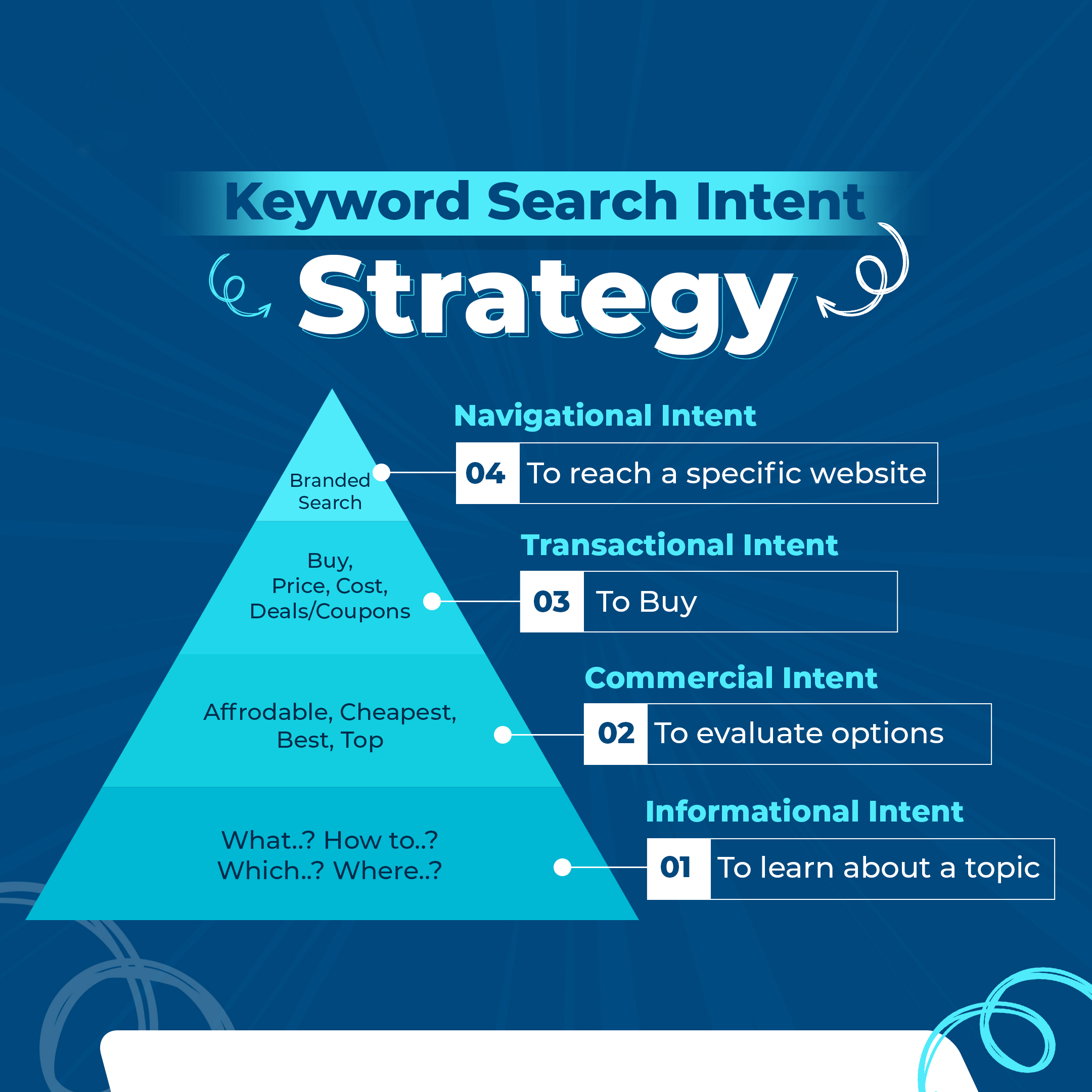When you search for something on the internet, have you ever wondered why certain websites appear at the top? Well, it’s not just by chance. It’s all about keywords and what people are looking for. You see, when we search, we have different intentions. Sometimes, we’re trying to learn something new; other times, we’re searching for a particular website, and then there are times when we’re ready to buy something. The keywords we type depending on our search intent is called keyword intent.
What is Keyword Intent?
It refers to the purpose or goal behind a user’s search query. It’s all about understanding what users want when they type something into a search engine. Suppose the users search something on Google like “best restaurants in my area”, they intend to find recommendations for local dining options. By understanding search intent, businesses and content creators can adapt their websites and content to meet users’ needs better and provide relevant information.
Read also: Keyword research checklist to improve your website ranking.
Why is Keyword Search Intent Important in SEO?
Search intent is essential for SEO because it helps to make sure that your website or content aligns with what users are looking for. When you understand the purpose behind the users’ search questions, you can create content that meets their needs increases the chances of your website appearing in relevant search results.

Here’s why search intent is important for SEO:
Relevant
Relevance in SEO means that your content directly matches what users are searching for. When your website or content is relevant to the users’ search query, it increases the possibility of your website appearing in search results. This is important because users are more likely to click on and engage with content that addresses their needs and interests. By optimizing your content to align with keyword search tools, you can boost the relevance of your website and attract more organic traffic.
User Satisfaction
User satisfaction refers to the contentment or fulfillment users experience when interacting with a website or online platform. From the SEO point of view, user satisfaction is crucial because search engines prioritize delivering the best possible user experience. When users find what they’re looking for in search results and click on the website, they expect the content to be relevant, informative, and easy to navigate. Suppose the website meets expectations and provides a positive user experience. Its content is engaging and unique. Then, users will likely stay on the site and potentially convert into customers.
Conversion
If you have optimized your site and its content for your target audiences’ search intent, the likelihood of them turning into customers or taking the desired action, such as purchasing or filling out a form increases. So, understand the intent behind a user’s search query to improve your content and cater to users who are ready to take action.
For example, if you are a vendor selling gaming laptops and your audience is searching for “best laptops for gaming,”. By creating content that specifically targets their need for gaming laptops, such as a detailed buying guide or reviews of the top gaming laptops, you can satisfy their needs. As a result, this will increase the conversion potential of your website and can lead to higher sales.
Competitive Advantage
Analyzing and understanding the search intent can give you insights into your competitors’ actions. By effectively identifying gaps or areas where your competitors are not coming up with user intent, you can create content that fills up those gaps and provides a better user experience. This can give you a competitive advantage in search rankings, attract more organic traffic, and make you stand out.
What are the Types of Keyword Intent?
Now that you know how important keyword intent is for SEO let us find out different types of search intent so that you know the intention of your audience when they search online. It will help you understand at which stage of the buyer’s journey your audience is and create content accordingly.

There are four different types of keywords exist. Let’s discuss them one by one:
1. Informational Keyword Intent
Informational keywords are search words used by people looking for specific knowledge or answers to their questions. These keywords show that the user seeks knowledge or wants to learn about a particular topic. Generally, consumers are in the awareness stage when they use such keywords.
For example, if someone is searching for “benefits of meditation,” chances are they just want information about meditation and not looking to do any course in mediation. So, optimize your content accordingly.
While optimizing your content for informational keywords, provide valuable and appropriate information that answers the user’s questions. This can be done through articles, blog posts, or videos. Ensure that the content is well-researched, and easy to understand.

Further, to rank well for informational keywords, it’s essential to use them strategically in the content, including in the title, headings, and throughout the body. Additionally, providing additional links and references can help establish credibility and authority. Lastly, remember to focus on providing valuable information concisely and helpfully.
2. Commercial Keyword Intent
Commercial keywords indicate a user’s intention to research or purchase a product or service. These keywords often include words like “best,” “affordable,” “top,” or specific brand names. For example, “best smartphone deals.” Now, this keyword shows that the person is looking for information on the best smartphone deals, suggesting their intention to purchase. When users use commercial keywords, they actively seek information about products or services to make an informed decision or complete a deal. Advertisers target these keywords to show relevant ads and capture customers’ attention.

People using commercial keywords are more likely to make a purchase. So, tell them the best price of your service and inform them what your service or products are better than the rest.
3. Transactional Keyword Intent
Transactional keywords refer to specific words used in online search queries that indicate the intent of the user to perform a transaction, such as making a purchase, signing up for a service, or engaging in some form of financial exchange. For example, if someone is searching for iPhone X, the keyword “buy” indicates their intention to transact and purchase the product. Other keywords include discount, deal, coupon, order, and price.

These keywords often consider a user’s readiness to take action, and businesses often target these keywords in their online marketing campaigns to attract potential customers who are closer to the decision-making stage.
4. Navigational Keyword Intent
Navigational keywords are used when someone is searching for a specific brand, website or page and wants to swiftly access it without going through search results. These keywords show that the user already knows what they are looking for and wants to navigate to a specific website directly. For example, “brand” if someone searches for a Facebook login, they use navigational keywords to find the login page of Facebook.

These keywords help users save time and directly reach their desired destination.
Final Words
Understanding keyword intent helps you connect with users and makes your online content more effective. Knowing keyword intent and optimizing your content for it can help your website be more visible to people searching online. If they find what they’re looking for, it’s going to be rewarding for your website. So, the next time you optimize SEO of your site, be sure to keep keyword intent in mind. For more information you can consult our digital marketing expert.




